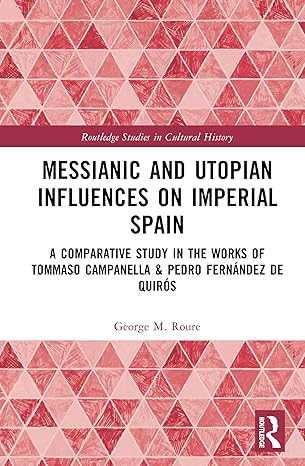
Messianic and Utopian Influences on Imperial Spain: A Comparative Study in the Works of Tommaso Campanella and Pedro Fernández de Quirós (Routledge Studies in Cultural History)
Author(s): George M. Roure (Author)
- Publisher: Routledge
- Publication Date: 17 April 2025
- Edition: 1st
- Language: English
- Print length: 172 pages
- ISBN-10: 1032861339
- ISBN-13: 9781032861333
Book Description
Roure draws a novel connection between Tommaso Campanella’s utopian ideas for Imperial Spain and Catholicism and Portuguese navigator Pedro Fernández de Quirós’ vision of an idyllic society and a mythical city of New Jerusalem in the antipodes.
The book presents newfound evidence suggesting Spain experimented with Messianism to secure their empire in the late Renaissance. The case is made that the Spanish monarchy contemplated Campanella’s Messianic ideas and sent Quirós to initiate them on the imagined Terra Australis Incognita. Campanella and Quirós shared idiosyncratic beliefs that by means of divine providence Spanish power would imminently transform the world, elevate humanity to a higher spiritual plane, dominate politics and religion, and prepare for the second coming. The work advances our understanding of previously unknown links amongst Campanella’s religious solutions for idealising temporal government, Quirós’s objective of a utopian society in the great south land, and Spain’s tentative experimentation with Messianism. It also permits the drawing of inferences on the possible rationale behind political messianism in the contemporary world.
This book is a valuable resource for scholars, students, researchers, and professionals interested in European and World History of the late Renaissance as well as those interested in the religious and political imperatives of Imperial Spain during the Habsburg period.
Product description
Review
“Messianic and Utopian Influences on Imperial Spain provides a daring approach to the study of the projects of conquest in the Spanish Pacific by connecting the works of Pedro Fernández de Quirós and Tomasso Campanella. Roure interrogates both authors’ influence on the Spanish Crown’s expansion overseas, offering a convincing insight into the plans to conquer the Great South Land as the ultimate location for establishing the Spanish Universal Monarchy.”
Noemí Martín Santo, PhD, Assistant Professor of Spanish, Central Connecticut State University, USA
“This is an insightful study of the influence of messianic thought in the Habsburg court of Spain. In contrast to the prevailing view that even millennial ideas had limited impact, Messianic and Utopian Influences demonstrates that there was abiding interest in messianic thought, notably in the hands of Tommaso Campanella and Pedro Fernández de Quirós. Such ideas could be, and were, taken as heretical, but not by everyone. A messianic outlook, nonetheless, inspired the Habsburg monarchs as they contemplated what to do with Spain’s oceanic holdings. A must read for anyone interested in early modern political thought.”
Thomas J. Kuehn, Professor, Clemson University, USA
“The Portuguese navigator Pedro Fernándes de Queiros has often been seen as a lonely dreamer with idiosyncratic ideas about the millenarian significance of the discovery of the Terra Australis Incognita. This detailed, comparative study strongly suggests otherwise. By tracing the close resemblance between Queirós’s millenarian ideas and those of the Italian monk Thomasso Campanella, George Roure suggests that members of the Spanish court, perhaps even Philip III himself, had absorbed Campanella’s ideas about the destiny of the Spanish Monarchy to become the redemptive Fifth Empire of the prophetic tradition, and had charged Queirós with the task of triggering the millenium through exploration. Roure provides a glimpse into a fascinating moment of Spanish history, when the harbingers of impending decline were being interpreted as signs of a new Golden Age.”
Ricardo Padron, Professor of Spanish, University of Virginia, USA
About the Author
George M. Roure is an Australian historian with origins from Spain’s Catalonia region. Author of The 16th Century Spanish Plan to Make Australia the New Holy Land, he is the first academic researcher to closely study Quirós’s messianic ideas and connect him to the Dominican Philosopher Tommaso Campanella.